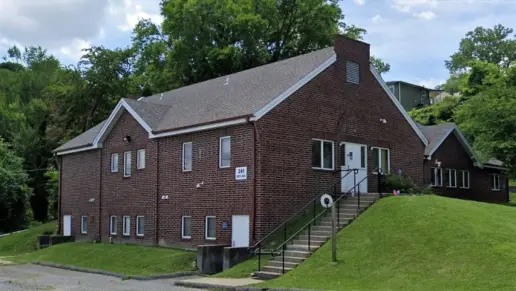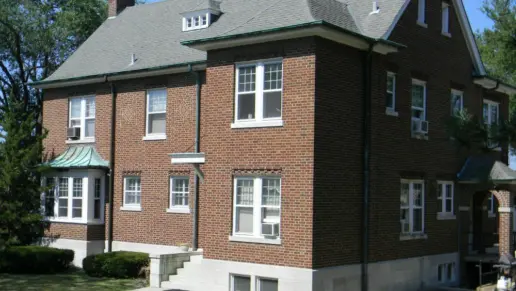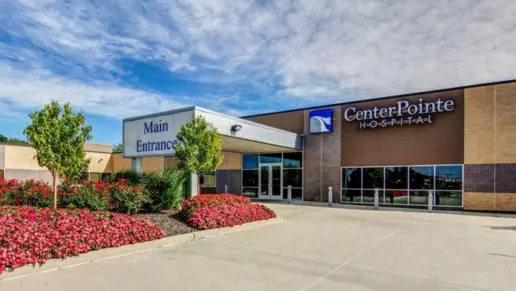Like everyone else who falls prey. They can't keep you past 96 hours without a commitment hearing. They will eavesdrop on calls and cut the line if you try calling out for help. Don't "yeah, but" or try and 'splain the law to them, they will rough you up and chemically restr ...
About CenterPointe Hospital
CenterPointe Hospital is a 150 bed private psychiatric hospital in St. Charles, MO offering specialized behavioral health treatment for adults, adolescents, and seniors. The range of services encompasses intervention, assessment, treatment, education, and referral.
Located in St. Charles, MO, CenterPointe Hospital is a psychiatric hospital offering inpatient and outpatient treatment for adults, adolescents, and seniors. Specialized programs cover a full spectrum of care, including residential, inpatient, and intensive outpatient programs (IOP).
The adult inpatient program is for adults who have a substance use disorder or dual diagnosis. The highly structured program focuses on coping skills and environmental supports. Average length of stay is seven to 10 days.
The adult residential program is for adults 18 and older who are struggling with substance abuse. At this level of treatment, adults can also receive care for a dual diagnosis. The program offers 24/7 support but is less intensive than inpatient care. Typical length of stay is 14-28 days.
The Stepping Stones Program is a personalized inpatient treatment program for adolescents ages 12-17. Treatment addresses both substance use disorders and dual diagnosis disorders. Participants receive 24/7 support and intensive therapy. Average length of stay is seven to 10 days.
The adolescent residential program offers treatment for adolescents ages 12-17. Support is provided for both substance use disorder and mental health disorder concerns (dual diagnosis). This live-in, structured care typically lasts for 14 to 28 days.
This short term program lasts seven to 10 days. It provides medical and therapeutic support to allow patients to safely and comfortably withdraw from addictive substances.
CenterPointe’s intensive outpatient programs (IOP) typically include three hours of treatment, three days per week. Average length of this program is four to six weeks. IOPs are available for adolescents, adults, and seniors.
CenterPointe’s partial hospitalization program is designed for adults and adolescents ages 12-17. Patients attend treatment four to five hours per day. Treatment typically lasts five to seven days.
The Silver Lining program provides inpatient treatment for adults 65 and older who are suffering from behavioral health conditions as well as those who have substance use disorders.
Medication assisted treatment (MAT) is available for adults aged 18 and older who are addicted to heroin, painkillers, or other opioids. MAT services are provided at all levels of care.
Facility Overview
Rehab Score
Gallery
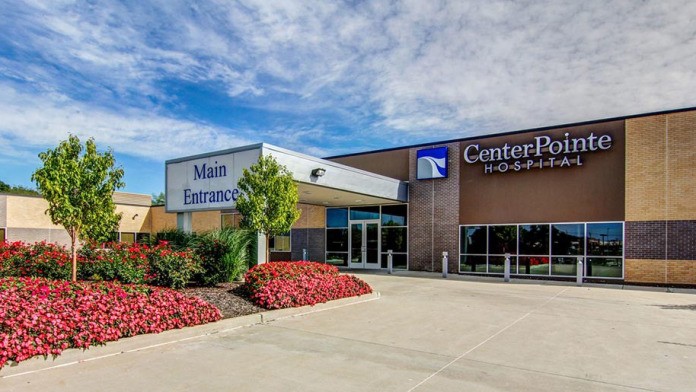
Location
Accepted Insurance
Other Forms of Payment
Medicaid is a state based program that helps lower-income individuals and families pay for healthcare. Medicaid covers addiction treatment so those enrolled can use their coverage to pay for rehab. When a program accepts Medicaid the client often pays very little or nothing out of their own pocket.
Private insurance refers to any kind of healthcare coverage that isn't from the state or federal government. This includes individual and family plans offered by an employer or purchased from the Insurance Marketplace. Every plan will have different requirements and out of pocket costs so be sure to get the full details before you start treatment.
Self-pay involves paying for treatment out of your own pocket. You can use savings or credit, get a personal loan, or receive help from family and friends to fund your treatment. If you don't have insurance or your insurance plan doesn't cover a specific program, self-pay can help ensure you still get the care you need.
Financial aid can take many forms. Centers may have grants or scholarships available to clients who meet eligibility requirements. Programs that receive SAMHSA grants may have financial aid available for those who need treatment as well. Grants and scholarships can help you pai for treatment without having to repay.
Medicare is a federal program that provides health insurance for those 65 and older. It also serves people under 65 with chronic and disabling health challenges. To use Medicare for addiction treatment you need to find a program that accepts Medicare and is in network with your plan. Out of pocket costs and preauthorization requirements vary, so always check with your provider.
Military members, veterans, and eligible dependents have access to specific insurance programs that help them get the care they need. TRICARE and VA insurance can help you access low cost or no cost addiction and mental health treatment. Programs that accept military insurance often have targeted treatment focused on the unique challenges military members, veterans, and their families face.
Addiction Treatments
Levels of Care
Treatments
The goal of treatment for alcoholism is abstinence. Those with poor social support, poor motivation, or psychiatric disorders tend to relapse within a few years of treatment. For these people, success is measured by longer periods of abstinence, reduced use of alcohol, better health, and improved social functioning. Recovery and Maintenance are usually based on 12 step programs and AA meetings.
Drug rehab in Missouri usually involves several phases: detox, rehab, and aftercare. The rehab phase may include a combination of inpatient and outpatient treatments, as the individual moves through a continuum of care on their recovery journey.
Many of those suffering from addiction also suffer from mental or emotional illnesses like schizophrenia, bipolar disorder, depression, or anxiety disorders. Rehab and other substance abuse facilities treating those with a dual diagnosis or co-occurring disorder administer psychiatric treatment to address the person's mental health issue in addition to drug and alcohol rehabilitation.
A combined mental health and substance abuse rehab has the staff and resources available to handle individuals with both mental health and substance abuse issues. It can be challenging to determine where a specific symptom stems from (a mental health issue or an issue related to substance abuse), so mental health and substance abuse professionals are helpful in detangling symptoms and keeping treatment on track.
Opioid rehabs specialize in supporting those recovering from opioid addiction. They treat those suffering from addiction to illegal opioids like heroin, as well as prescription drugs like oxycodone. These centers typically combine both physical as well as mental and emotional support to help stop addiction. Physical support often includes medical detox and subsequent medical support (including medication), and mental support includes in-depth therapy to address the underlying causes of addiction.
Programs




Clinical Services
Cognitive Behavioral Therapy (CBT) is a therapy modality that focuses on the relationship between one's thoughts, feelings, and behaviors. It is used to establish and allow for healthy responses to thoughts and feelings (instead of unhealthy responses, like using drugs or alcohol). CBT has been proven effective for recovering addicts of all kinds, and is used to strengthen a patient's own self-awareness and ability to self-regulate. CBT allows individuals to monitor their own emotional state, become more adept at communicating with others, and manage stress without needing to engage in substance abuse.
Experiential therapy is a form of therapy in which clients are encouraged to surface and work through subconscious issues by engaging in real-time experiences. Experiential therapy departs from traditional talk therapy by involving the body, and having clients engage in activities, movements, and physical and emotional expression. This can involve role-play or using props (which can include other people). Experiential therapy can help people process trauma, memories, and emotion quickly, deeply, and in a lasting fashion, leading to substantial and impactful healing.
Spouses, children, parents and siblings sometimes endure years of complex emotions and strained relationships resulting from a loved one's addiction. The Family Group offers weekly support for family members and significant others of patients currently receiving care in one of CenterPointe's addiction treatment programs. Family meetings with CenterPointe staff help provide additional information to enhance the patient's treatment plan, the patient's progress or to establish discharge plans.
Group therapy is any therapeutic work that happens in a group (not one-on-one). There are a number of different group therapy modalities, including support groups, experiential therapy, psycho-education, and more. Group therapy involves treatment as well as processing interaction between group members.
In individual therapy, a patient meets one-on-one with a trained psychologist or counselor. Therapy is a pivotal part of effective substance abuse treatment, as it often covers root causes of addiction, including challenges faced by the patient in their social, family, and work/school life.
Life skills trainings involve all the skills a person must have in order to function successfully in the world. These include time management, career guidance, money management, and effective communication. Truly successful addiction recovery is based on the ability to not only live substance-free, but to thrive. Life skills teaches the practical necessities of functioning in society, which sets clients up for success in life, and therefore sobriety.
Nutrition therapy, aka medical nutrition therapy (MNT), is a way of treating physical, emotional, and medical conditions through diet. Specific dietary plans are designed by professional nutritionists or registered dietitians, and patients follow them in order to positively affect their physical and mental health.
Trauma therapy addresses traumatic incidents from a client's past that are likely affecting their present-day experience. Trauma is often one of the primary triggers and potential causes of addiction, and can stem from child sexual abuse, domestic violence, having a parent with a mental illness, losing one or both parents at a young age, teenage or adult sexual assault, or any number of other factors. The purpose of trauma therapy is to allow a patient to process trauma and move through and past it, with the help of trained and compassionate mental health professionals.
Amenities
-
Residential Setting
Staff & Accreditations
Staff

CEO

Chief Medical Director
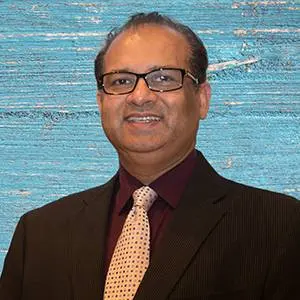
Medical Director

Director of Health Information Management/Performance Improvement & Risk Management

Director of Facilities
Accreditations

LegitScript has reviewed CenterPointe Hospital as part of their certification program, and has determined that it meets the LegitScript standards for legality, safety and transparency.
LegitScript verified in

The Joint Commission, formerly known as JCAHO, is a nonprofit organization that accredits rehab organizations and programs. Founded in 1951, the Joint Commision's mission is to improve the quality of patient care and demonstrating the quality of patient care.
Joint Commission Accreditation: Yes
Contact Information
4801 Weldon Spring Parkway
Saint Charles, MO 63304




